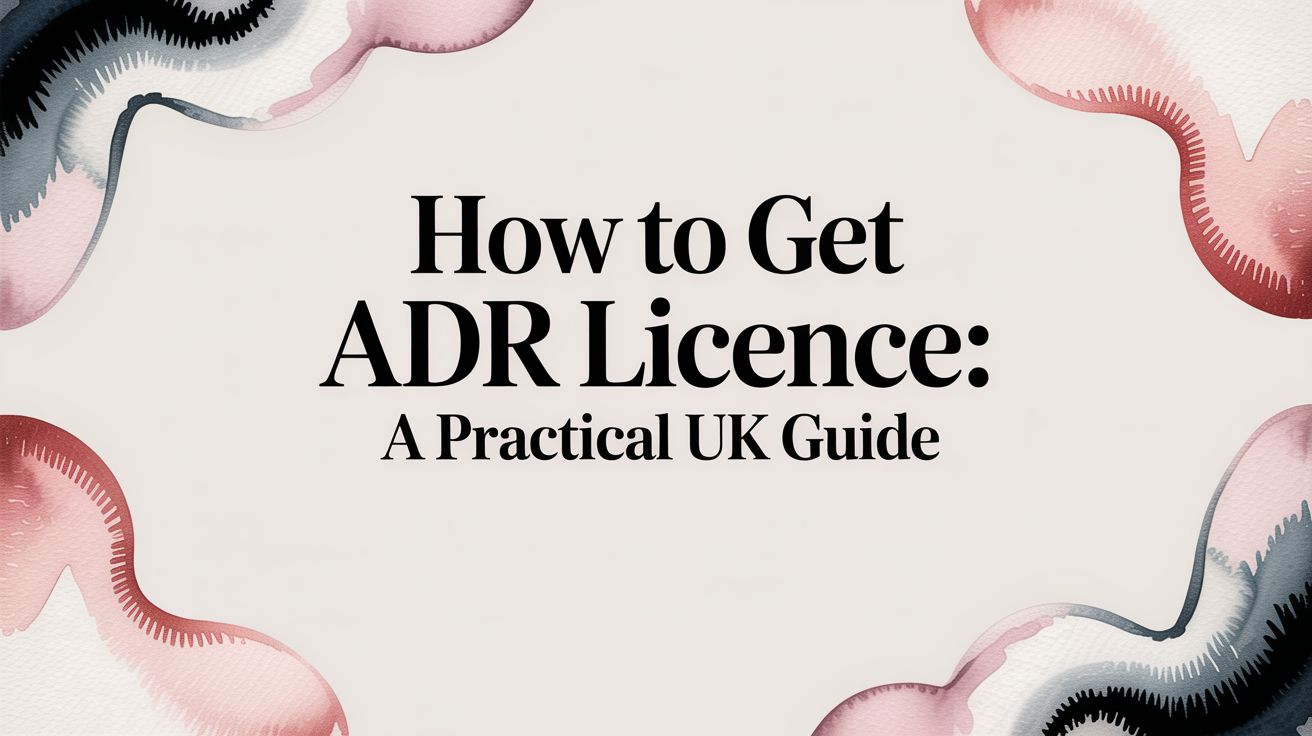Related Articles

21/01/2026
How to Get an ADR Licence: A Practical UK Guide


Good health is essential for every professional driver. Long hours, irregular schedules, and time spent sitting behind the wheel can take a toll on the body and mind. For HGV drivers, maintaining health and fitness isn’t just about feeling good, it’s about staying safe, alert and legally fit to drive. This complete guide explores essential HGV driver health tips, offering practical advice to help you stay well throughout your driving career. We’ll cover nutrition, exercise, mental wellbeing, and compliance with DVLA medical requirements so you can stay on the road with confidence.
Driving a heavy goods vehicle requires long periods of concentration and physical endurance. Poor health can affect reaction times, mood, and decision-making. Fatigue, back pain, and stress are common issues, but they can be managed with the right routines. Looking after your health can also reduce absenteeism and increase job satisfaction.
Maintaining good health also helps you meet DVLA medical standards. Whether you’re applying for your first licence or renewing an existing one, passing the HGV medical check is crucial. Staying fit can help you avoid delays or restrictions on your driving record. It also gives you peace of mind, knowing you are legally and physically able to do your job safely.
Eating well on the road can be a challenge, especially with limited food choices at service stations. But small changes can make a big difference. Try to pack healthy snacks like fruit, unsalted nuts, and wholegrain options to help you avoid high-fat or high-sugar alternatives. Preparing meals in advance allows you to make more nutritious choices and avoid reliance on fast food.
Make hydration a priority. Drinking plenty of water improves concentration, prevents headaches, and supports overall physical health. Carry a reusable water bottle and set reminders to drink regularly throughout the day. Avoid overconsumption of caffeine, especially late in your shift, as it can affect sleep patterns.
You don’t need a gym membership to stay active. Even a short walk during breaks can improve circulation and reduce stiffness. Try stretching before and after your shift to ease joint tension and improve mobility. If you have longer breaks, take a brisk walk or do light bodyweight exercises such as squats, lunges or press-ups.
Some drivers keep resistance bands in their cab for short workouts at rest stops. Staying physically active boosts energy, reduces stress, and can even help with weight management. These simple routines help combat the risks linked with prolonged sitting and can reduce your chances of injury.
Driving can be isolating, especially on long routes or night shifts. Looking after your mental wellbeing is just as important as physical health. Stay connected with loved ones by calling or messaging during breaks. Listening to music, podcasts or audiobooks can also lift your mood and keep your mind engaged.
If you’re struggling with stress or low mood, speak up. Many employers offer access to mental health services or counselling. There are also national helplines and online communities dedicated to supporting HGV drivers. A healthy mind is essential for safe, attentive driving and enjoying your time on the road.
Fatigue is one of the biggest health risks for drivers. Sleep debt can build up over time and affect concentration, memory, and coordination. Aim for consistent, good-quality rest. Create a bedtime routine, even when working shifts, to help your body wind down. Use blackout curtains or an eye mask when sleeping during the day.
Keep your sleep environment quiet and cool. Avoid using screens before bed, as blue light can interfere with melatonin production. If you’re feeling tired during a shift, find a safe place to take a short nap. Prioritising rest helps prevent accidents and supports your long-term health.
HGV drivers must meet medical standards set by the DVLA. This includes eyesight tests, blood pressure checks and screening for conditions like diabetes, heart disease, or sleep apnoea. Regular health checks help you stay informed and address any concerns before they affect your ability to drive.
Make a habit of scheduling annual check-ups with your GP. Monitoring your weight, blood pressure and cholesterol can help identify potential risks early. If you have a chronic condition, make sure it’s well-managed and that you’re following medical advice.
For a full breakdown of what to expect from a medical, see our guide to HGV medical requirements. Staying informed and proactive makes the process easier when it’s time to renew your licence.
Building lasting habits takes time, but consistency pays off. Start small and set achievable goals. Whether it’s eating more vegetables, taking short daily walks, or going to bed earlier, each step supports your long-term wellbeing. A structured routine helps create a sense of balance even with irregular shift patterns.
Using apps to track food intake, exercise, hydration, and sleep can help build better habits. Journals, calendars or reminder tools are also effective for staying on track. Planning your week ahead and building healthy routines into your schedule can make a real difference.
Consider sharing your health goals with colleagues. A bit of accountability, or even friendly competition, can motivate you to stick to your plans. Over time, small actions lead to bigger improvements in energy, focus and overall performance.
Being an HGV driver doesn’t mean putting your health on hold. In fact, staying fit and well is one of the best ways to ensure a long, successful driving career. From improving concentration to meeting medical requirements, every healthy choice supports your ability to do the job well. Staying active, eating well, and prioritising rest all help you stay safe and productive behind the wheel.
By following these HGV driver health tips and making positive changes over time, you can enjoy life on the road and keep your body and mind in top condition. For more information, visit our driver wellness content or contact HGV Learning for training support.

21/01/2026

Complete the form below and we’ll contact you asap.

